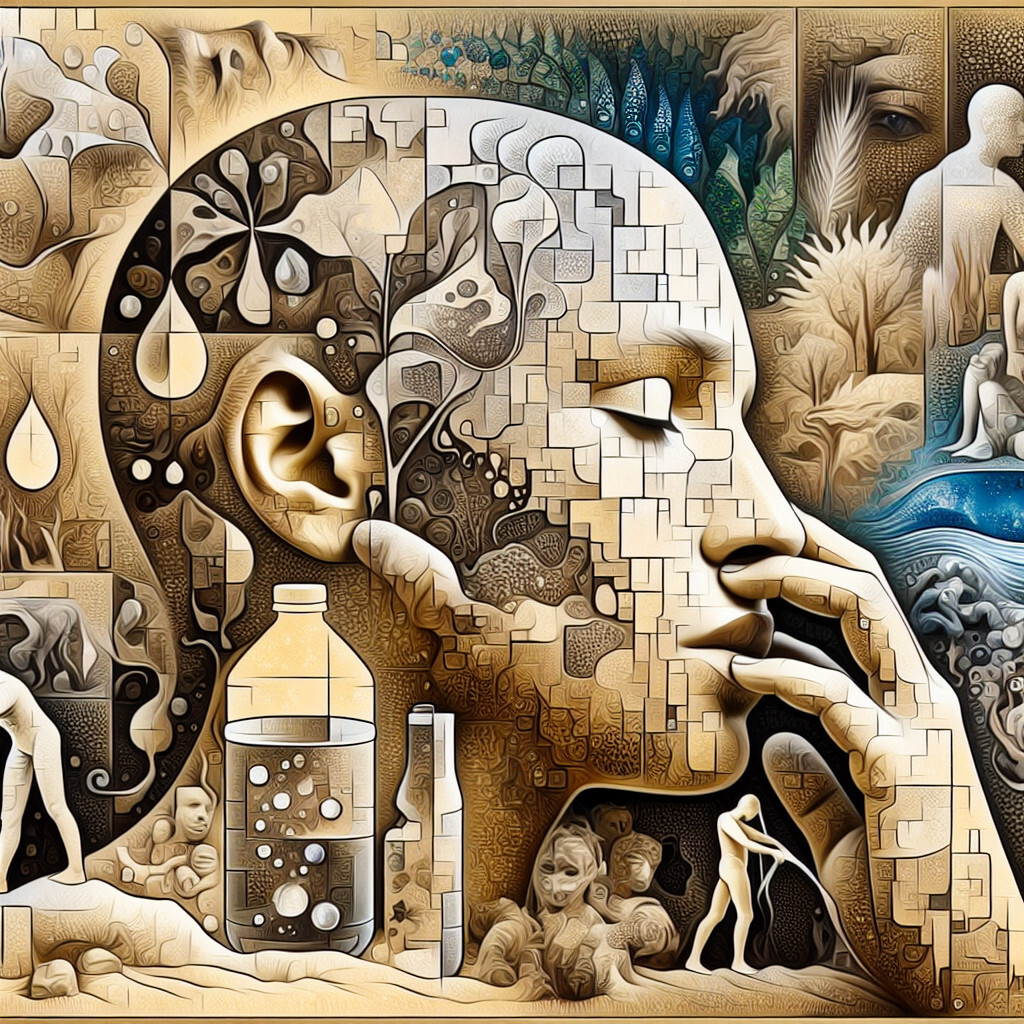-
Table of Contents
“Dehydration: The Silent Saboteur of Your Health.”
Introduction

Insufficient water intake can lead to a myriad of health issues, ranging from mild to severe. The human body is composed of about 60% water, which plays a crucial role in various bodily functions, including maintaining body temperature, removing waste, and lubricating joints. When the body does not receive an adequate amount of water, it can lead to dehydration, which can cause headaches, fatigue, skin problems, and even more serious conditions like kidney stones and urinary tract infections. Chronic dehydration may also impact cognitive functions, mood, and overall performance. Therefore, understanding the health effects of not drinking enough water is essential for maintaining optimal health and wellbeing.
Understanding the Impact of Dehydration on Physical Health
Water is an essential component of life, constituting about 60% of the human body. It plays a crucial role in various bodily functions, including digestion, absorption, circulation, creation of saliva, transportation of nutrients, and maintenance of body temperature. However, many people do not consume enough water daily, leading to chronic dehydration, a condition that can have serious health implications.
Dehydration occurs when the body loses more fluids than it takes in, causing a deficiency in the amount of water and other fluids needed for normal body functions. This deficiency can lead to a myriad of health problems, ranging from mild to severe. One of the most immediate effects of not drinking enough water is the impact on physical performance. Even mild dehydration can lead to physical fatigue, reduced endurance, and impaired motor skills. This is particularly concerning for athletes and those who engage in high-intensity physical activities, as their performance can be significantly compromised.
Moreover, chronic dehydration can have detrimental effects on the cardiovascular system. The heart must work harder to pump blood when the body is dehydrated, leading to an increased heart rate and reduced blood pressure. Over time, this can result in an elevated risk of developing cardiovascular diseases, including hypertension and stroke.
The kidneys, which are responsible for filtering waste products from the blood and maintaining electrolyte balance, are also adversely affected by inadequate water intake. Dehydration can lead to the formation of kidney stones, a painful condition caused by the accumulation of mineral deposits in the kidneys. In severe cases, chronic dehydration can even contribute to kidney disease.
Furthermore, not drinking enough water can negatively impact the digestive system. Water aids in the digestion of food and the absorption of nutrients. Without sufficient water, the body may struggle to digest food properly, leading to constipation, acid reflux, and other digestive disorders.
The brain is another organ that heavily relies on adequate hydration. Dehydration can impair cognitive function, affecting concentration, alertness, and short-term memory. It can also lead to headaches and migraines, as the brain shrinks from lack of water, pulling away from the skull and causing pain.
In addition to these physical health effects, chronic dehydration can also have implications for skin health. The skin, the body’s largest organ, requires ample hydration to maintain its elasticity and texture. Dehydration can lead to dry, flaky skin, and over time, it can contribute to premature aging, including the development of fine lines and wrinkles.
In conclusion, the health effects of not drinking enough water are far-reaching, affecting various bodily functions and organs. From physical performance to cardiovascular health, kidney function, digestion, cognitive function, and skin health, adequate hydration is crucial for maintaining overall health. Therefore, it is essential to consume enough water daily, with the recommended intake being at least eight 8-ounce glasses, or about 2 liters, although this can vary depending on individual needs. By understanding the impact of dehydration on physical health, individuals can make informed decisions about their water consumption and take steps to ensure they are adequately hydrated.
The Hidden Dangers of Not Drinking Enough Water
Water is a fundamental element of life, and its importance to our health cannot be overstated. It is a vital component of every cell in our bodies, playing a crucial role in various bodily functions, from regulating body temperature to aiding digestion. Despite its significance, many people do not consume enough water daily, exposing themselves to a myriad of health risks. This article aims to shed light on the hidden dangers of not drinking enough water.
Dehydration is the most immediate and apparent consequence of not drinking enough water. It occurs when the body loses more fluids than it takes in, leading to an imbalance in the body’s water levels. Mild dehydration can cause symptoms such as dry mouth, fatigue, and headaches. However, if left unchecked, severe dehydration can lead to more serious complications like kidney stones, urinary tract infections, and even kidney failure.
Moreover, inadequate water intake can negatively impact cognitive function. Research has shown that even mild dehydration can impair memory, attention, and motor skills. It can also affect mood, leading to increased feelings of anxiety and fatigue. This is because the brain is approximately 75% water, and any decrease in water levels can disrupt its normal functioning.
Digestive problems are another common issue associated with insufficient water intake. Water aids in the digestion of food and the absorption of nutrients in the gut. Without enough water, the body struggles to digest food effectively, leading to constipation, bloating, and other digestive issues. Over time, chronic dehydration can contribute to the development of more serious digestive disorders like gastritis and ulcers.
Furthermore, not drinking enough water can have detrimental effects on the skin. Water helps to maintain skin elasticity and replenish skin tissues. When the body is dehydrated, the skin can become dry, flaky, and more prone to wrinkling. This not only affects the skin’s appearance but also its ability to serve as a protective barrier against external factors like UV rays and pollutants.
In addition to the above, inadequate water intake can also impact cardiovascular health. The heart needs to work harder to pump blood when the body is dehydrated, which can increase the risk of heart disease over time. Moreover, dehydration can lead to a decrease in blood volume, which can cause a drop in blood pressure and increase the likelihood of fainting.
In conclusion, not drinking enough water can have far-reaching effects on our health, affecting everything from our cognitive function to our cardiovascular health. It is recommended that men consume about 3.7 liters of water per day, and women about 2.7 liters, though this can vary depending on factors like age, physical activity level, and climate. It’s important to remember that all fluids count towards this total, including those from food. However, water is the best choice as it is free of calories and added sugars. By ensuring we drink enough water each day, we can help to safeguard our health and wellbeing.
How Insufficient Water Intake Affects Your Mental Wellbeing
Water, the most abundant and essential element on earth, plays a crucial role in maintaining our overall health and wellbeing. It is a well-known fact that water is vital for our physical health, aiding in digestion, nutrient absorption, and detoxification. However, the impact of water on our mental wellbeing is often overlooked. Insufficient water intake can have profound effects on our cognitive functions, mood, and overall mental health.
Dehydration, even mild, can significantly affect our brain function. The human brain is approximately 75% water, and any decrease in the water level can lead to alterations in brain structure and function. Cognitive functions such as attention, memory, and reasoning are particularly sensitive to the hydration status of the brain. Studies have shown that even mild dehydration can impair these cognitive functions, leading to decreased concentration, short-term memory problems, and difficulty in problem-solving.
Moreover, dehydration can also affect our mood and emotional state. Research has found a strong correlation between hydration status and mood. Dehydration can lead to feelings of anger, confusion, and fatigue. It can also exacerbate symptoms of depression and anxiety. This is because water plays a crucial role in the production of mood-influencing hormones like serotonin and dopamine. When the body is dehydrated, it can disrupt the balance of these hormones, leading to mood swings and emotional instability.
Insufficient water intake can also impact our sleep quality, which in turn affects our mental health. Water is essential for the production of melatonin, the hormone that regulates our sleep-wake cycle. Dehydration can disrupt the production of this hormone, leading to sleep disturbances such as insomnia or fragmented sleep. Poor sleep quality is linked to various mental health issues, including depression, anxiety, and cognitive decline.
Furthermore, water is essential for maintaining the balance of electrolytes in our body. Electrolytes are minerals that carry electrical charges and are crucial for various bodily functions, including nerve function. When we are dehydrated, the balance of these electrolytes is disrupted, which can lead to neurological symptoms such as headaches, dizziness, and confusion.
In addition to these direct effects on mental health, insufficient water intake can also indirectly affect our mental wellbeing through its impact on physical health. Chronic dehydration can lead to various health problems such as kidney stones, urinary tract infections, and constipation. These health issues can cause discomfort and stress, which can negatively impact our mental health.
In conclusion, water is not just essential for our physical health, but it is equally important for our mental wellbeing. Insufficient water intake can lead to cognitive impairment, mood disturbances, sleep problems, and other mental health issues. Therefore, it is crucial to maintain adequate hydration to ensure optimal mental health. This can be achieved by drinking sufficient amounts of water throughout the day, eating water-rich fruits and vegetables, and avoiding excessive consumption of diuretics such as coffee and alcohol. Remember, your brain needs water to function optimally, so keep yourself hydrated for a healthy mind.
Chronic Dehydration: Long-Term Health Consequences of Not Drinking Enough Water
Chronic dehydration, the long-term health consequence of not drinking enough water, is a condition that is often overlooked, yet it can have serious implications for our overall health and wellbeing. The human body is approximately 60% water, and this vital fluid plays a crucial role in numerous bodily functions, including digestion, absorption, circulation, creation of saliva, transportation of nutrients, and maintenance of body temperature. When the body is not adequately hydrated, these functions can become compromised, leading to a variety of health problems.
One of the most immediate and noticeable effects of chronic dehydration is its impact on physical performance. Water is essential for muscle function, and when the body is dehydrated, muscles can become fatigued more quickly. This can lead to decreased strength, speed, and endurance, making physical activities more difficult and less enjoyable. Moreover, dehydration can also affect cognitive performance. Studies have shown that even mild dehydration can impair memory and concentration, leading to decreased productivity and increased feelings of fatigue.
Chronic dehydration can also have serious implications for the cardiovascular system. When the body is dehydrated, the volume of blood in the body decreases, causing the heart to work harder to pump blood and deliver oxygen and nutrients to the cells. Over time, this can lead to an increased heart rate and blood pressure, which can increase the risk of heart disease and stroke.
The kidneys, which are responsible for filtering waste products from the blood and maintaining electrolyte balance, are also significantly affected by chronic dehydration. Without adequate water, the kidneys must work harder to remove waste from the body, which can lead to kidney stones and, in severe cases, kidney failure.
Furthermore, chronic dehydration can also affect the health of the skin. The skin is the body’s largest organ and requires a significant amount of water to maintain its elasticity and suppleness. When the body is dehydrated, the skin can become dry, flaky, and more prone to wrinkling.
In addition to these physical health effects, chronic dehydration can also have psychological effects. Dehydration can affect mood and can lead to feelings of irritability and confusion. Some studies have even suggested a link between chronic dehydration and depression, although more research is needed in this area.
Despite the serious health consequences associated with chronic dehydration, it is a condition that is often preventable. Health experts recommend drinking at least eight 8-ounce glasses of water per day, although individual needs can vary based on factors such as age, sex, weight, and physical activity level. It’s also important to remember that certain foods, such as fruits and vegetables, can also contribute to hydration.
In conclusion, chronic dehydration is a serious condition that can have wide-ranging effects on the body. From decreased physical and cognitive performance to increased risk of heart disease and kidney failure, the health effects of not drinking enough water are far-reaching. However, by making a conscious effort to stay adequately hydrated, these health risks can be significantly reduced.
Q&A
Question 1: What are the physical symptoms of not drinking enough water?
Answer 1: Physical symptoms of dehydration include dry mouth, fatigue, dizziness, decreased urine output, dry skin, and headache.
Question 2: How does not drinking enough water affect our brain function?
Answer 2: Dehydration can impair cognitive functions such as focus, memory, and mood. It can also cause headaches and migraines.
Question 3: Can not drinking enough water lead to serious health problems?
Answer 3: Yes, chronic dehydration can lead to serious health problems like kidney stones, urinary tract infections, and even kidney failure.
Question 4: How does dehydration affect physical performance?
Answer 4: Dehydration can lead to reduced strength, endurance, and coordination. It can also increase fatigue, making physical activities more difficult and exhausting.
Conclusion
In conclusion, not drinking enough water can lead to serious health effects such as dehydration, kidney stones, urinary tract infections, constipation, and impaired cognitive function. It can also negatively impact physical performance and skin health. Therefore, maintaining adequate hydration is crucial for overall health and well-being.






